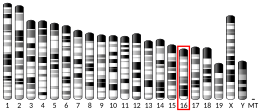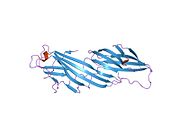AP2M1
Appearance
AP-2 complex subunit mu is a protein that in humans is encoded by the AP2M1 gene.[5]
Function
This gene encodes a subunit of the heterotetrameric coat assembly protein complex 2 (AP2), which belongs to the adaptor complexes medium subunits family. The encoded protein is required for the activity of a vacuolar ATPase, which is responsible for proton pumping occurring in the acidification of endosomes and lysosomes. The encoded protein may also play an important role in regulating the intracellular trafficking and function of CTLA-4 protein. Two transcript variants encoding different isoforms have been found for this gene.[6]
Interactions
AP2M1 has been shown to interact with CTLA-4[7][8] and Alpha-1B adrenergic receptor.[9]
References
- ^ a b c GRCh38: Ensembl release 89: ENSG00000161203 – Ensembl, May 2017
- ^ a b c GRCm38: Ensembl release 89: ENSMUSG00000022841 – Ensembl, May 2017
- ^ "Human PubMed Reference:". National Center for Biotechnology Information, U.S. National Library of Medicine.
- ^ "Mouse PubMed Reference:". National Center for Biotechnology Information, U.S. National Library of Medicine.
- ^ Druck T, Gu Y, Prabhala G, Cannizzaro LA, Park SH, Huebner K, Keen JH (Nov 1995). "Chromosome localization of human genes for clathrin adaptor polypeptides AP2 beta and AP50 and the clathrin-binding protein, VCP". Genomics. 30 (1): 94–7. doi:10.1006/geno.1995.0016. PMID 8595912.
- ^ "Entrez Gene: AP2M1 adaptor-related protein complex 2, mu 1 subunit".
- ^ Follows ER, McPheat JC, Minshull C, Moore NC, Pauptit RA, Rowsell S, Stacey CL, Stanway JJ, Taylor IW, Abbott WM (Oct 2001). "Study of the interaction of the medium chain mu 2 subunit of the clathrin-associated adapter protein complex 2 with cytotoxic T-lymphocyte antigen 4 and CD28". The Biochemical Journal. 359 (Pt 2): 427–34. doi:10.1042/0264-6021:3590427. PMC 1222163. PMID 11583591.
- ^ Chuang E, Alegre ML, Duckett CS, Noel PJ, Vander Heiden MG, Thompson CB (Jul 1997). "Interaction of CTLA-4 with the clathrin-associated protein AP50 results in ligand-independent endocytosis that limits cell surface expression". Journal of Immunology. 159 (1): 144–51. PMID 9200449.
- ^ Diviani D, Lattion AL, Abuin L, Staub O, Cotecchia S (May 2003). "The adaptor complex 2 directly interacts with the alpha 1b-adrenergic receptor and plays a role in receptor endocytosis". The Journal of Biological Chemistry. 278 (21): 19331–40. doi:10.1074/jbc.M302110200. PMID 12644451.
{{cite journal}}: CS1 maint: unflagged free DOI (link)
Further reading
- Ohno H, Stewart J, Fournier MC, Bosshart H, Rhee I, Miyatake S, Saito T, Gallusser A, Kirchhausen T, Bonifacino JS (Sep 1995). "Interaction of tyrosine-based sorting signals with clathrin-associated proteins". Science. 269 (5232): 1872–5. doi:10.1126/science.7569928. PMID 7569928.
- Liu Q, Feng Y, Forgac M (Dec 1994). "Activity and in vitro reassembly of the coated vesicle (H+)-ATPase requires the 50-kDa subunit of the clathrin assembly complex AP-2". The Journal of Biological Chemistry. 269 (50): 31592–7. PMID 7989329.
- Pauloin A, Thurieau C (Dec 1993). "The 50 kDa protein subunit of assembly polypeptide (AP) AP-2 adaptor from clathrin-coated vesicles is phosphorylated on threonine-156 by AP-1 and a soluble AP50 kinase which co-purifies with the assembly polypeptides". The Biochemical Journal. 296 ( Pt 2) (2): 409–15. PMC 1137711. PMID 8257432.
- Chang MP, Mallet WG, Mostov KE, Brodsky FM (May 1993). "Adaptor self-aggregation, adaptor-receptor recognition and binding of alpha-adaptin subunits to the plasma membrane contribute to recruitment of adaptor (AP2) components of clathrin-coated pits". The EMBO Journal. 12 (5): 2169–80. PMC 413438. PMID 8491205.
- Wang X, Kilimann MW (Jan 1997). "Identification of two new mu-adaptin-related proteins, mu-ARP1 and mu-ARP2". FEBS Letters. 402 (1): 57–61. doi:10.1016/S0014-5793(96)01500-1. PMID 9013859.
- Chuang E, Alegre ML, Duckett CS, Noel PJ, Vander Heiden MG, Thompson CB (Jul 1997). "Interaction of CTLA-4 with the clathrin-associated protein AP50 results in ligand-independent endocytosis that limits cell surface expression". Journal of Immunology. 159 (1): 144–51. PMID 9200449.
- Zhang Y, Allison JP (Aug 1997). "Interaction of CTLA-4 with AP50, a clathrin-coated pit adaptor protein". Proceedings of the National Academy of Sciences of the United States of America. 94 (17): 9273–8. doi:10.1073/pnas.94.17.9273. PMC 23153. PMID 9256472.
- Ohno H, Aguilar RC, Fournier MC, Hennecke S, Cosson P, Bonifacino JS (Nov 1997). "Interaction of endocytic signals from the HIV-1 envelope glycoprotein complex with members of the adaptor medium chain family". Virology. 238 (2): 305–15. doi:10.1006/viro.1997.8839. PMID 9400603.
- Santini F, Marks MS, Keen JH (May 1998). "Endocytic clathrin-coated pit formation is independent of receptor internalization signal levels". Molecular Biology of the Cell. 9 (5): 1177–94. doi:10.1091/mbc.9.5.1177. PMC 25339. PMID 9571248.
- Owen DJ, Evans PR (Nov 1998). "A structural explanation for the recognition of tyrosine-based endocytotic signals". Science. 282 (5392): 1327–32. doi:10.1126/science.282.5392.1327. PMID 9812899.
- Berlioz-Torrent C, Shacklett BL, Erdtmann L, Delamarre L, Bouchaert I, Sonigo P, Dokhelar MC, Benarous R (Feb 1999). "Interactions of the cytoplasmic domains of human and simian retroviral transmembrane proteins with components of the clathrin adaptor complexes modulate intracellular and cell surface expression of envelope glycoproteins". Journal of Virology. 73 (2): 1350–61. PMC 103959. PMID 9882340.
- Teuchert M, Berghöfer S, Klenk HD, Garten W (Dec 1999). "Recycling of furin from the plasma membrane. Functional importance of the cytoplasmic tail sorting signals and interaction with the AP-2 adaptor medium chain subunit". The Journal of Biological Chemistry. 274 (51): 36781–9. doi:10.1074/jbc.274.51.36781. PMID 10593987.
{{cite journal}}: CS1 maint: unflagged free DOI (link) - Umeda A, Meyerholz A, Ungewickell E (May 2000). "Identification of the universal cofactor (auxilin 2) in clathrin coat dissociation". European Journal of Cell Biology. 79 (5): 336–42. doi:10.1078/S0171-9335(04)70037-0. PMID 10887964.
- Jullien-Flores V, Mahé Y, Mirey G, Leprince C, Meunier-Bisceuil B, Sorkin A, Camonis JH (Aug 2000). "RLIP76, an effector of the GTPase Ral, interacts with the AP2 complex: involvement of the Ral pathway in receptor endocytosis". Journal of Cell Science. 113 ( Pt 16) (16): 2837–44. PMID 10910768.
- Wyss S, Berlioz-Torrent C, Boge M, Blot G, Höning S, Benarous R, Thali M (Mar 2001). "The highly conserved C-terminal dileucine motif in the cytosolic domain of the human immunodeficiency virus type 1 envelope glycoprotein is critical for its association with the AP-1 clathrin adaptor [correction of adapter]". Journal of Virology. 75 (6): 2982–92. doi:10.1128/JVI.75.6.2982-2992.2001. PMC 115924. PMID 11222723.
- Morris SM, Cooper JA (Feb 2001). "Disabled-2 colocalizes with the LDLR in clathrin-coated pits and interacts with AP-2". Traffic. 2 (2): 111–23. doi:10.1034/j.1600-0854.2001.020206.x. PMID 11247302.
- Follows ER, McPheat JC, Minshull C, Moore NC, Pauptit RA, Rowsell S, Stacey CL, Stanway JJ, Taylor IW, Abbott WM (Oct 2001). "Study of the interaction of the medium chain mu 2 subunit of the clathrin-associated adapter protein complex 2 with cytotoxic T-lymphocyte antigen 4 and CD28". The Biochemical Journal. 359 (Pt 2): 427–34. doi:10.1042/0264-6021:3590427. PMC 1222163. PMID 11583591.
- Friocourt G, Chafey P, Billuart P, Koulakoff A, Vinet MC, Schaar BT, McConnell SK, Francis F, Chelly J (Sep 2001). "Doublecortin interacts with mu subunits of clathrin adaptor complexes in the developing nervous system". Molecular and Cellular Neurosciences. 18 (3): 307–19. doi:10.1006/mcne.2001.1022. PMID 11591131.













